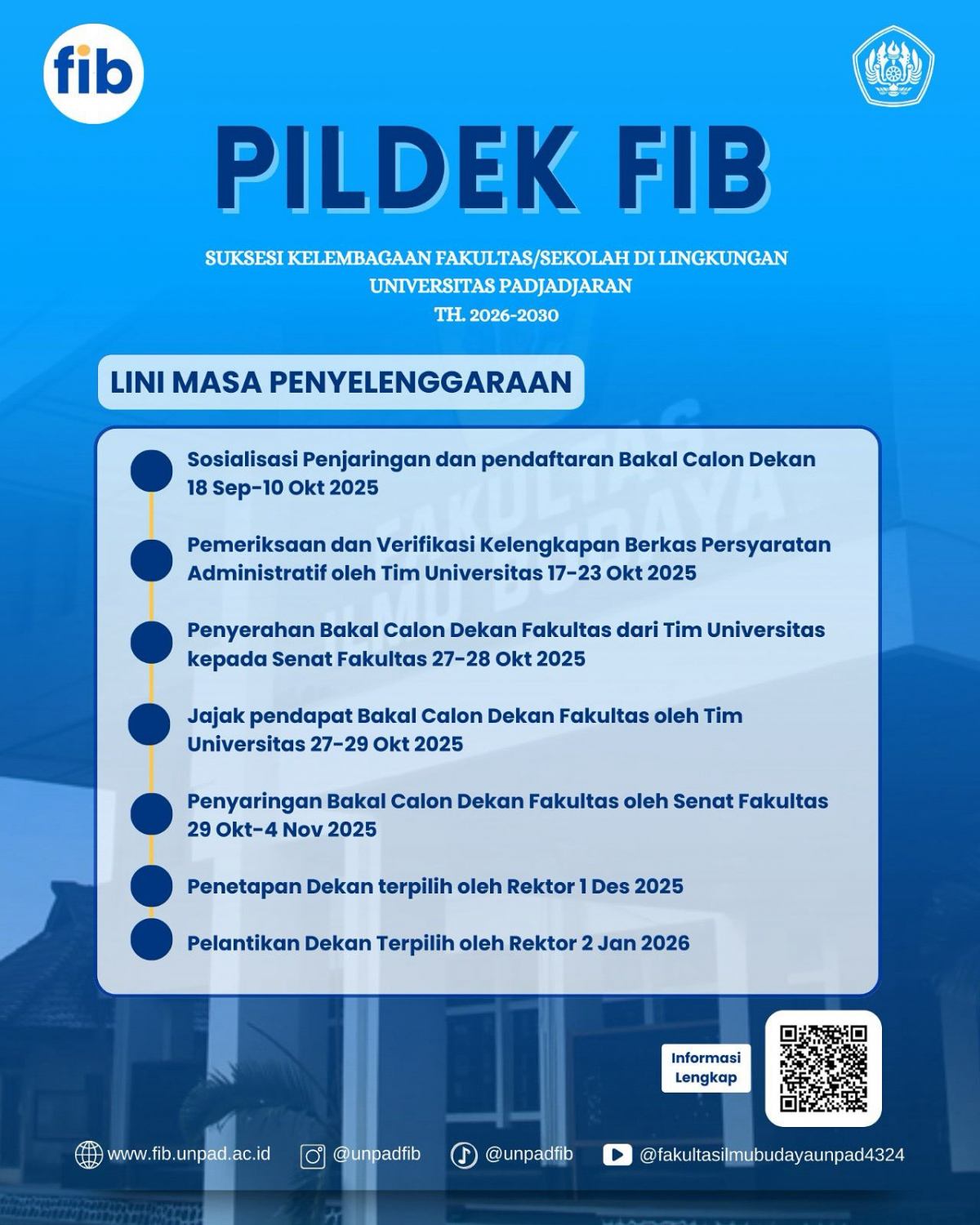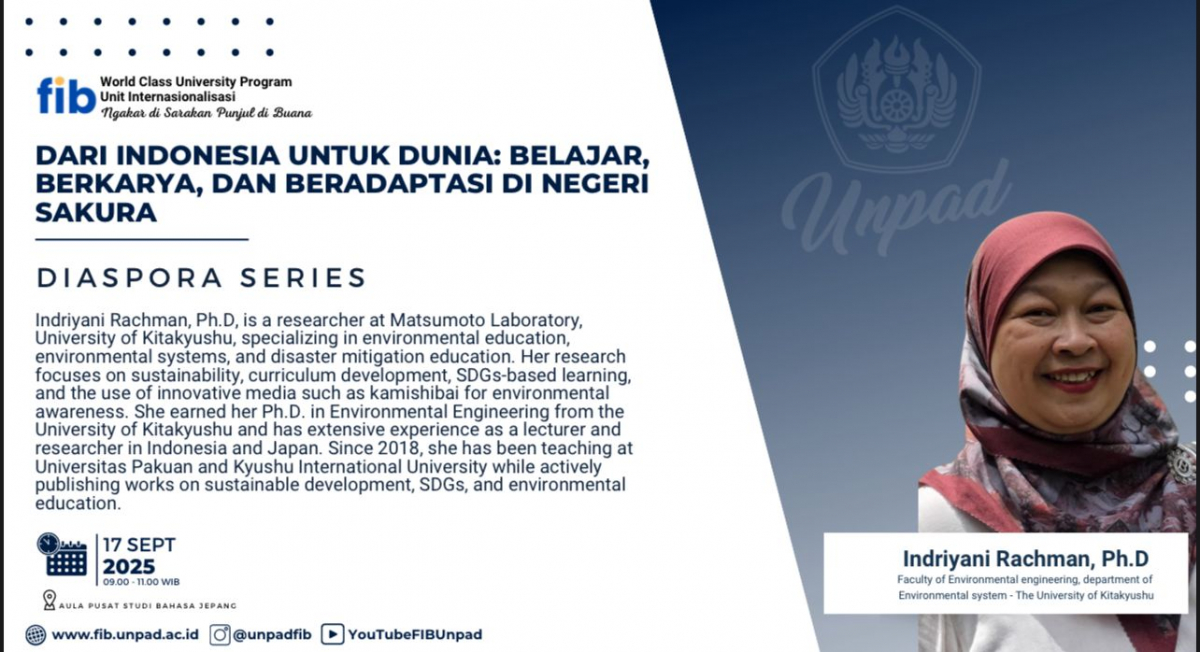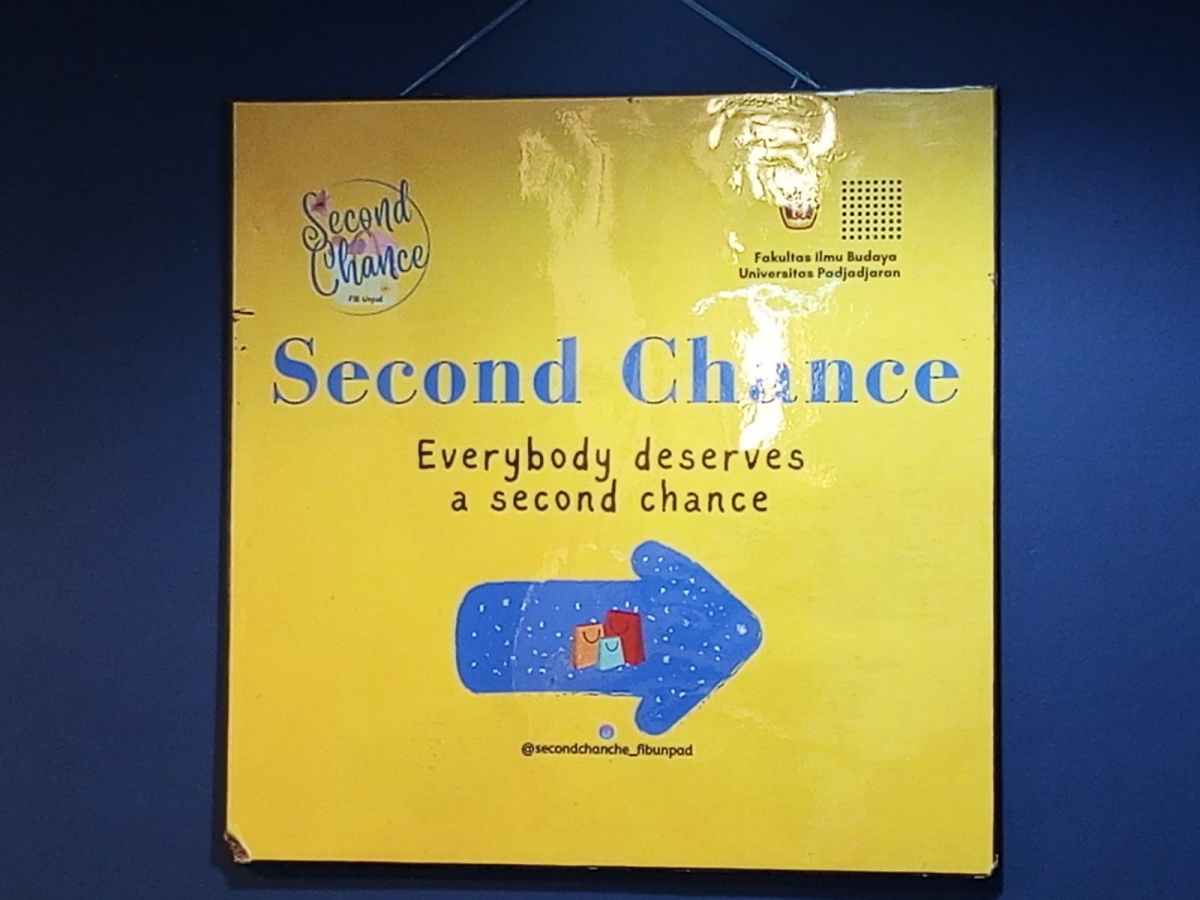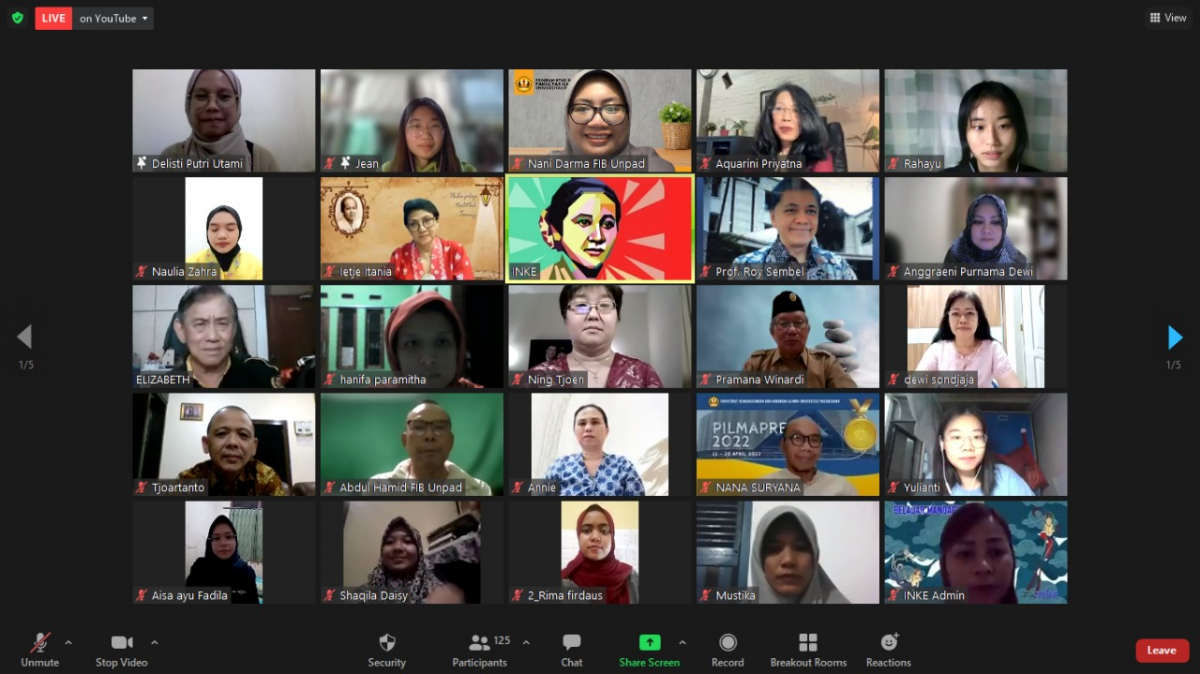
Hari Kartini : FIB Unpad dan GXUN selenggarakan kuliah umum Perempuan dan Transformasi Sosial
Pada tanggal 20 April pukul 20.00 – 22.00, Fakultas Ilmu Budaya Universitas Padjadjaran bekerja sama dengan Program Indonesia Keluargaku, Universitas Kebangsaan Guangxi (GXUN), dan Universitas Bahasa Asing GXUN menyelenggarakan kuliah umum secara daring bertajuk “Perempuan dan Transformasi Sosial: Kesetaraan Gender untuk Semua” yang dibawakan oleh Prof. Aquarini Priyatna, M.A., M.Hum., Ph.D. yang juga adalah Dekan FIB Unpad. Acara ini diikuti oleh dosen dan mahasiswa dari ketiga universitas, dosen dan mahasiswa dari universitas lain di Indonesia dan Tiongkok, serta masyarakat umum.
Kegiatan ini dibuka oleh beberapa sambutan dari penyelenggara, persembahan video tentang Indonesia dan Tiongkok, serta pembacaan Puisi tentang Kartini yang dibacakan oleh Naulia, Mahasiswa Sastra Indonesia.
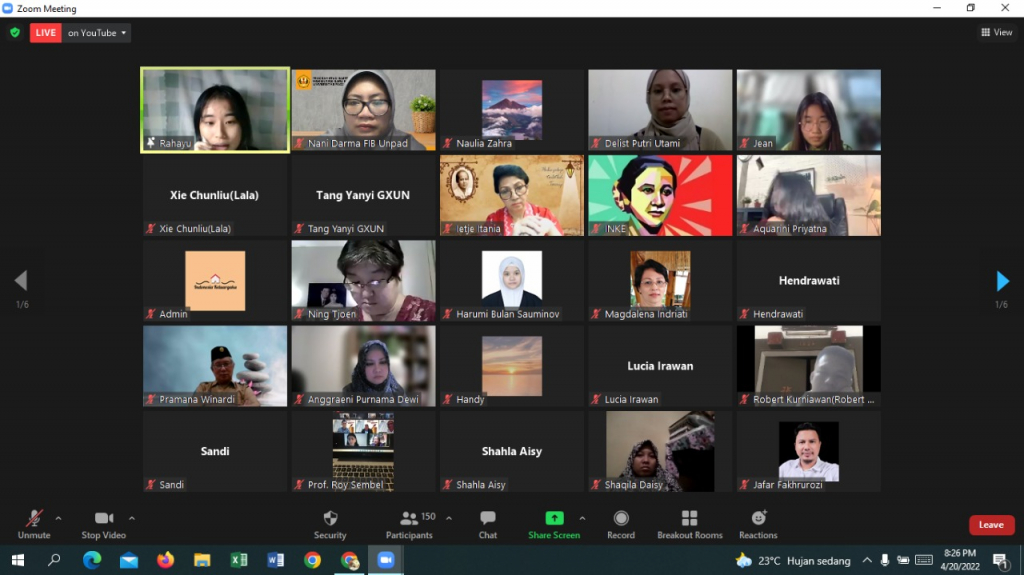
Sebelum memasuki pada acara inti kuliah umum, dipaparkan terlebih dahulu mengenai pandangan umum masyarakat Tiongkok masa lalu terhadap wanita yang disampaikan oleh Rahayu, mahasiswa GXUN semester ketiga. Pandangan masyarakat feodal Tiongkok adalah masyarakat patrilineal yang didominasi laki-laki. Perempuan tidak berhak berpartisipasi dalam urusan pemerintahan. Pria sebagai pemegang kendali membuat berbagai cara untuk mengekang perempuan.
Dalam masyarakat feodal seorang wanita harus mematuhi tiga ketaatan dan empat kebajikan. Tiga ketaatan adalah : pertama sebelum menikah taat kepada Ayah, kedua sesudah menikah taat pada suami, ketiga suami meninggal taat pada anak laki-laki, itulah yang dinamakan 3 ketaatan, sedangkan empat kebajikan mengacu pada 妇德、妇言、妇容、妇功 yaitu moral wanita, kata-kata wanita, penampilan wanita, dan jasa wanita.
Setelah berdirinya Tiongkok Baru, para wanita yang digerakan oleh 杨开慧Yang Kaihui, 向警予Xiang Jingyu, dan邓颖超 Deng Yingchao memulai gerakan pembebasan wanita, melawan prasangka feodal bahwa “laki-laki lebih tinggi dari wanita” dan “wanita yang lemah” adalah sebuah kebajikan. Mereka bahkan mengorbankan hidup mereka untuk “persamaan hak antara pria dan wanita” di Tiongkok.
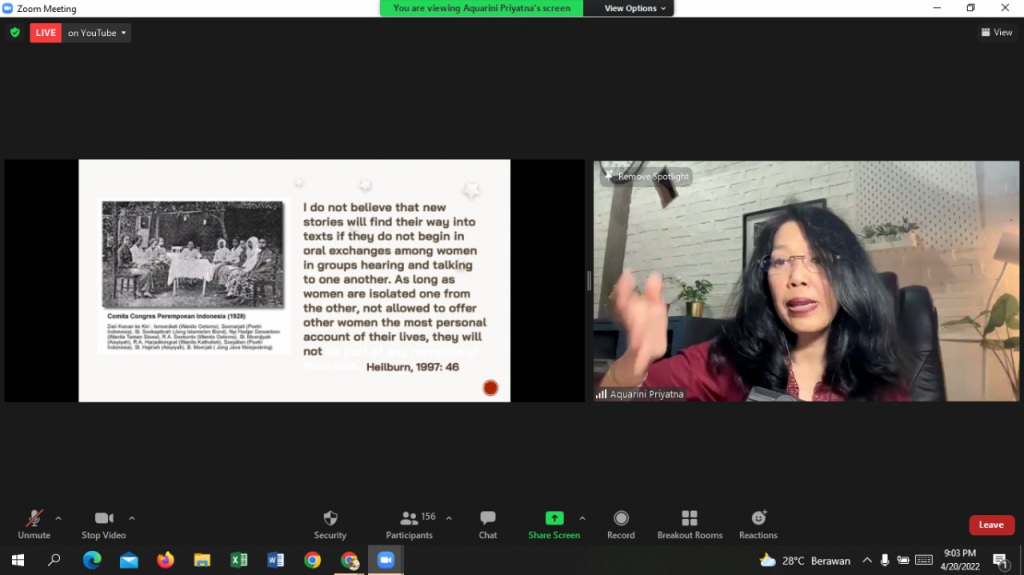
Pada acara inti kuliah umum Prof. Aquarini Priyatna, M.A., M.Hum., Ph.D. membuka paparannya dengan menjelaskan perbedaan antara emansipasi dan kesetaraan, bahwa saat ini tidak lagi menggunakan kata emansipasi, tapi lebih tepat menggunakan kesetaraan karena kata emansipasi memiliki makna menyamakan kedudukan, padahal dalam konteks ini tidak berarti perempuan harus sama seperti laki-laki.
Selanjutnya, beliau menjelaskan mengapa perjuangan Kartini lebih dikenal di Indonesia; karena Kartini menulis dekat dengan kolonial Belanda. Kartini menulis tentang kegalauanya, tentang hasratnya untuk sekolah, tentang kepedihannya atas ketidakadilan, tentang gagasan idealnya tentang laki-laki dan perempuan. Prof. Aquarini juga mengenalkan beberapa tokoh pahlawan perempuan lainnya di Indonesia, yaitu Dewi Sartika, Kartini-Kardinah-Roekmini, Maria J.C. Maramis, Rohana Kudus, Rasuna Said, Cut Nyak Dien, Martina Cristina Tijahahu, Opung Daeng Risaju, Nyi Ageng Serang. Ini menunjukkan bahwa perjuangan kesetaraan gender ini dilakukan oleh banyak orang, bukan sendirian. Karena tidak ada perjuangan yang bisa diselesaikan oleh satu orang.
Seterusnya Prof. Aquarini mengatakan bahwa dari apa yang dilakukan oleh para pejuang perempuan sebelumnya menunjukkan bahwa menulis adalah sebagai bentuk perjuangan dan menulis itu penting supaya kita bisa memaksa orang lain untuk mendengarkan kita; dan ia mencontohkan beberapa perempuan penulis Indonesia, seperti Lasminingrat, NH Dini, Suwarsih Djojopuspito.
Pada akhirnya beliau menegaskan bahwa membaca, menulis, dan bercerita adalah hal yang penting untuk perempuan karena pendidikan adalah kunci pembuka pikiran. Dan implikasi selanjutnya artinya adalah pendidikan sangat penting untuk perempuan. Jika kita berinvestasi pada perempuan untuk sekolah, keuntungan itu bukan hanya untuk dirinya, tapi juga untuk lingkungan sekitarnya. Perempuan yang memiliki pendidikan akan menjadi lokomotif bagi lingkungannya dan juga dapat berdampak pada kemandirian ekonomi dan ini dapat mendorong perempuan untuk menjadi lebih berani berkiprah di ranah lain. Jika hal ini sudah terbangun, pada titik inilah transformasi sosial terbangun.
